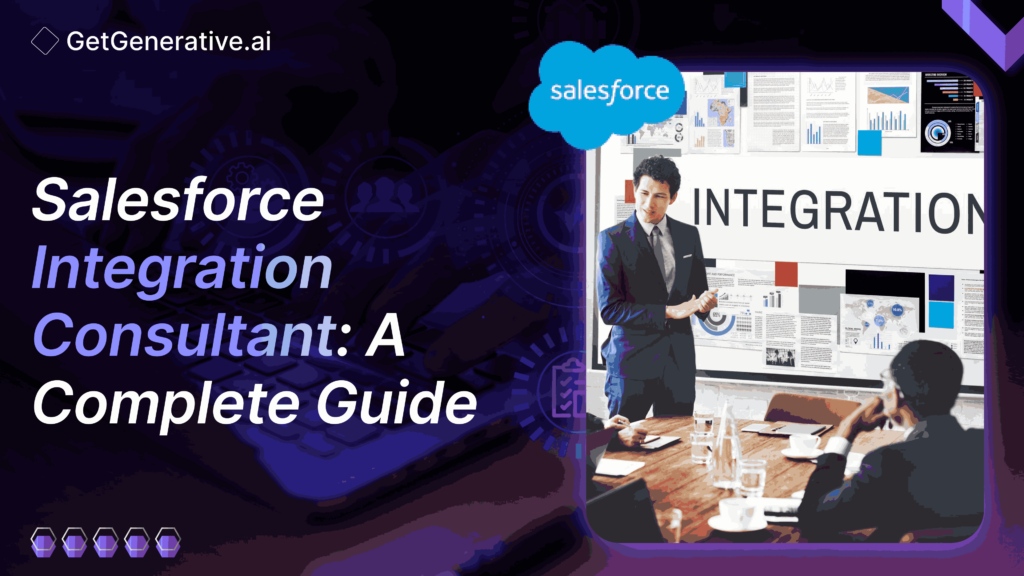Salesforce Integration Consultant: A Complete Guide 2024
In today’s digital landscape, efficient data management and seamless system integration are crucial for business success. Salesforce plays a pivotal role in this arena as a leading customer relationship management (CRM) platform.
According to recent statistics, 83% of Fortune 500 companies use Salesforce, and the platform boasts a 19.8% market share in the CRM industry. However, to truly harness the power of Salesforce, businesses often require expert guidance—enter the Salesforce Integration Consultant.
What is a Salesforce Integration Consultant?
A Salesforce Integration Consultant is a specialized professional who helps businesses seamlessly connect their Salesforce CRM with other software applications and systems. These experts deeply understand Salesforce’s architecture, API capabilities, and integration methodologies.
Their primary goal is to ensure that data flows smoothly between Salesforce and other business-critical applications, creating a unified ecosystem that enhances productivity and decision-making.
What are the Core Competencies of a Salesforce Integration Consultant?
Salesforce Integration Consultants possess a unique blend of technical expertise and business acumen. Their core competencies include:
Salesforce expertise:
- Deep understanding of Salesforce architecture, including standard and custom objects, fields, and relationships
- Proficiency in Salesforce customization using declarative tools (e.g., Process Builder, Flow Builder)
- Experience with Salesforce development using Apex, Visualforce, and Lightning Web Components
- Knowledge of the Salesforce security model, including profiles, permission sets, and sharing rules
Integration technologies:
- Mastery of various integration patterns (e.g., real-time, batch, event-driven)
- Proficiency in RESTful and SOAP API development and consumption
- Experience with ETL (Extract, Transform, Load) tools like Informatica, Talend, or MuleSoft
- Understanding of middleware solutions and iPaaS (Integration Platform as a Service) offerings
- Familiarity with messaging systems like Apache Kafka or RabbitMQ for event-driven architectures
Data management:
- Expertise in data modeling and normalization techniques
- Proficiency in data mapping and transformation processes
- Experience with data quality tools and best practices
- Understanding of data governance principles and implementation
Programming skills:
- Advanced knowledge of Apex, Salesforce’s proprietary programming language
- Proficiency in web technologies like JavaScript, HTML, and CSS
- Experience with additional programming languages such as Java, Python, or C#
- Understanding of object-oriented programming concepts and design patterns.
Also Read – Nonprofit Salesforce Consultants: A Complete Guide
Business process analysis:
- Ability to conduct thorough business process mapping and analysis
- Skills in identifying process inefficiencies and recommending improvements
- Experience in translating business requirements into technical specifications
- Understanding of various industry-specific processes and best practices
Problem-solving:
- Strong analytical skills to dissect complex integration challenges
- Creativity in developing innovative solutions to unique problems
- Ability to troubleshoot and resolve integration issues efficiently
- Experience in performance tuning and optimization of integrations
Project management:
- Proficiency in Agile methodologies, particularly Scrum
- Experience in creating and managing project plans, timelines, and budgets
- Strong communication skills to liaise between technical teams and business stakeholders
- Ability to manage risks and handle change requests effectively
Cloud computing and architecture:
- Understanding of cloud computing concepts and services (IaaS, PaaS, SaaS)
- Knowledge of distributed systems architecture
- Familiarity with microservices architecture and containerization (e.g., Docker)
- Experience with cloud platforms like AWS, Azure, or Google Cloud Platform
Security and compliance:
- Understanding of data protection regulations (e.g., GDPR, CCPA)
- Knowledge of encryption methods and secure data transmission protocols
- Experience in implementing Single Sign-On (SSO) and identity management solutions
- Familiarity with industry-specific compliance requirements (e.g., HIPAA for healthcare)
Continuous learning:
- Commitment to staying updated with the latest Salesforce releases and features
- Regular participation in Salesforce certifications and training programs
- Active involvement in Salesforce community events and forums
- Curiosity about emerging technologies and their potential impact on Salesforce integrations
These core competencies enable Salesforce Integration Consultants to design, implement, and maintain robust, scalable, and efficient integrations that align with business objectives and drive organizational success.
Related Read – Becoming a Salesforce Consultant – The Ultimate Guide
How do you integrate Salesforce with other business applications?
- Assess integration requirements: Identify the systems to be integrated and the data flow needs.
- Choose an integration method: You can choose from options like point-to-point, middleware, or iPaaS (Integration Platform as a Service).
- Data mapping: Define how data fields in different systems correspond.
- Develop integration: Use Salesforce APIs, Apex code, or third-party tools to build the integration.
- Test thoroughly: Conduct comprehensive testing to ensure data accuracy and system performance.
- Deploy and monitor: Implement the integration in production and set up monitoring tools.
Best Practices for Salesforce Integration
- Plan for scalability: Design integrations that handle growing data volumes and complexity.
- Prioritize data security: Implement robust security measures to protect sensitive information.
- Maintain data quality: Establish data validation and cleansing processes.
- Document extensively: Create detailed documentation for all integration processes and configurations.
- Implement error handling: Develop robust error handling and logging mechanisms.
- Regular maintenance: Schedule periodic reviews and updates of integrations.
What are the Key Benefits of Hiring a Salesforce Integration Consultant for a Medium-sized Enterprise?
- Expertise and efficiency: Leverage specialized knowledge for faster, more effective integrations.
- Cost-effectiveness: Avoid costly mistakes and optimize resource utilization.
- Customized solutions: Receive tailored integration strategies aligned with specific business needs.
- Improved data consistency: Ensure accurate and synchronized data across all systems.
- Enhanced productivity: Streamline workflows and reduce manual data entry.
- Scalability: Build integrations that can grow with the business.
- Ongoing support: Access expert assistance for maintenance and troubleshooting.
Also Read – Salesforce Data Cloud Consultant: The Role and Importance
Cost of Salesforce Integration Consulting Services
The cost of Salesforce integration consulting services can vary widely based on project complexity, integration scope, and consultant experience. Generally, businesses can expect to invest anywhere from $10,000 to $100,000+ for comprehensive integration projects.
Many consultants offer hourly rates ranging from $150 to $300 per hour. It’s crucial to obtain detailed quotes and consider the long-term ROI when evaluating costs.
Is a Salesforce Integration Consultant Necessary for Integrating Third-party Applications?
While in-house IT teams can handle some integrations, a Salesforce Integration Consultant is often necessary for complex or mission-critical integrations. Their specialized knowledge can be invaluable when dealing with:
- Multiple system integrations
- Complex data transformations
- High-volume data synchronization
- Custom API development
- Compliance and security requirements
- Performance optimization
A consultant may not be essential for simpler integrations or organizations with strong in-house Salesforce expertise. However, a consultant can provide valuable insights and best practices even in these cases.
Conclusion
In an increasingly interconnected business world, Salesforce Integration Consultants are crucial in helping organizations maximize their CRM investment. By seamlessly connecting Salesforce with other business-critical applications, these experts enable companies to streamline operations, improve data accuracy, and gain deeper insights into their customers and operations.
Enhance your Salesforce consulting with GetGenerative.ai. Effortlessly craft outstanding proposals, enabling you to dedicate more time to providing exceptional client service.
Start today!
Frequently Asked Questions (FAQs)
1. How long does a typical Salesforce integration project take?
Project duration can vary widely, from a few weeks for simple integrations to several months for complex, enterprise-wide projects.
2. Can Salesforce be integrated with any application?
While Salesforce offers extensive integration capabilities, not all applications have ready-made connectors. A skilled consultant can usually develop custom integrations for most business applications.
3. What’s the difference between a Salesforce Administrator and a Salesforce Integration Consultant?
While both roles require Salesforce expertise, Integration Consultants specialize in connecting Salesforce with other systems, requiring additional technical skills and knowledge of integration methodologies.
4. How often should Salesforce integrations be reviewed or updated?
It’s recommended that integrations be reviewed at least annually or whenever significant changes occur in connected systems or business processes.
5. What are some common challenges in Salesforce integration projects?
Common challenges include data quality issues, performance bottlenecks, security concerns, and aligning integration with evolving business needs.




